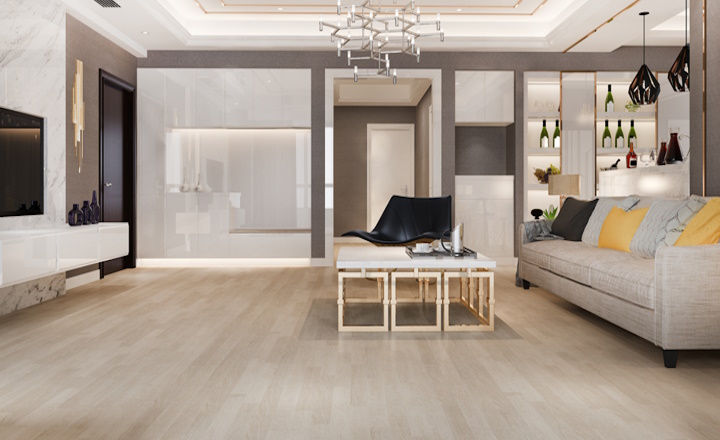
SPC vs WPC Hybrid Flooring: Which One Should You Choose?
If you've been exploring flooring options for your home or commercial space, you’ve likely come across the terms SPC and WPC. These two types of hybrid flooring often spark confusion among Australian homeowners—and for good reason. While both fall under the rigid-core vinyl flooring category, each offers unique benefits worth understanding before making a decision.
In this blog, we’ll break down the key differences between SPC and WPC flooring—covering everything from durability and comfort to cost and construction—so you can confidently choose the right solution for your space.
What Are SPC and WPC Hybrid Floors?
SPC (Stone Plastic Composite) and WPC (Wood Plastic Composite) are both forms of rigid-core luxury vinyl flooring—commonly called hybrid flooring because they combine the aesthetic of vinyl with a highly durable core structure. Both are 100% waterproof, making them ideal for kitchens, bathrooms, and commercial areas. However, the core composition is where the real differences lie.
SPC flooring features a dense, stone-based core that offers unmatched durability.
WPC flooring includes a foamed, wood-based core for enhanced softness underfoot.
Let’s explore each in more detail.
What Is SPC Hybrid Flooring?
SPC, or Stone Polymer Composite, is a hybrid flooring made with limestone powder, PVC, and stabilisers. Its rigid core gives it remarkable strength, making it ideal for high-traffic areas or commercial use. Unlike some flooring types that require a perfectly level surface, SPC can be installed over uneven subfloors with ease.
SPC Flooring Layer Breakdown
SPC hybrid flooring typically includes four core layers:
Backing Layer – Often features a pre-attached underlay for sound absorption and cushioning.
SPC Core – A highly dense, waterproof layer that resists warping and denting.
Printed Vinyl Layer – Provides realistic wood or stone visuals.
Wear Layer – Protects the floor from scratches, dents, and daily wear.
Advantages of SPC Flooring
100% Waterproof – Ideal for moisture-prone areas.
Highly Durable – Excellent resistance to dents and heavy foot traffic.
Low Maintenance – Easy to clean with occasional mopping.
Easy Installation – Click-lock mechanism simplifies DIY setup.
Great Aesthetics – Mimics real wood or stone convincingly.
Disadvantages of SPC Flooring
Less Comfortable – Harder underfoot due to the dense core.
Poor Heat Retention – Can feel cold during winter months.
Noise Transfer – May be louder without added underlayment.
Not Eco-Friendly – Made with PVC and synthetic materials.
Higher Cost Than Vinyl – Though generally cheaper than WPC.
What Is WPC Hybrid Flooring?
WPC, or Wood Plastic Composite, blends recycled wood fibres and plastic with foaming agents to produce a softer, more cushioned flooring solution. While still 100% waterproof, WPC’s core feels warmer and more comfortable—perfect for residential settings like kitchens or living rooms.
WPC Flooring Layer Breakdown
Like SPC, WPC hybrid flooring usually contains four layers:
Backing Layer – Often includes attached underlayment for added softness.
WPC Core – Waterproof and cushioned for enhanced comfort.
Printed Vinyl Layer – High-resolution images that simulate natural timber or stone.
Wear Layer – Shields against scratches and surface wear.
Advantages of WPC Flooring
Waterproof – Excellent for homes with pets or kids.
Soft Underfoot – More comfortable than SPC, especially for long-standing periods.
Stylish Design – High-end visuals create elegant interiors.
Simple Installation – Click-lock design supports easy setup.
Eco-Friendlier – Often made from recycled materials.
Disadvantages of WPC Flooring
Less Durable – The softer core may dent under heavy furniture or pressure.
Sun Damage – Prone to discolouration under intense UV exposure.
Thermal Expansion – Can warp if exposed to extreme temperature shifts.
Cost – Usually more expensive than SPC, though cheaper than hardwood.
SPC vs WPC: What’s the Difference?
Which Flooring Option Is Best for You?
There’s no one-size-fits-all answer—your decision should depend on your space, lifestyle, and budget.
Choose SPC if you need a tough, durable floor for commercial settings or high-traffic areas.
Choose WPC if comfort and warmth are your top priorities for a family home or cosy living space.
Final Thoughts
Both SPC and WPC hybrid flooring offer excellent waterproof protection, aesthetic appeal, and easy installation. Whether you're renovating your home or upgrading a commercial property, each has something unique to offer.
Still unsure? As trusted Brisbane hybrid flooring suppliers and Sydney hybrid flooring suppliers, Ezy Decking is here to guide you through the decision-making process. Contact us today for a tailored quote and expert advice that suits your goals and budget.
| < Prev | Next > |
|---|




